Final flight for Aussies fleeing Israel
Australians in Israel wanting to flee the crisis are being urged to take the final charter flight out of Tel Aviv.
A final charter flight will be made to Tel Aviv today to collect Australians still wanting to leave the region, with many yesterday hedging their bets for better flight options or simply not checking in.
The first charter put on by Qantas flew to London with an A380 today to depart the British capital for Australia but two further flights had to be suspended due to safety concerns largely around missiles.
Three flights were then dispatched overnight to Ben Gurion airport in the Israeli capital, including two RAAF aircraft, and were fully booked with a capacity to carry 800 passengers but only 255 bothered to turn up. All aircraft left less than half full.
The three aircraft went to Dubai for onward bound flights to Australia.
Australia’s Ambassador to Israel shared photos from the airport with the caption: “Very happy to see more Australians depart Israel safely today”.
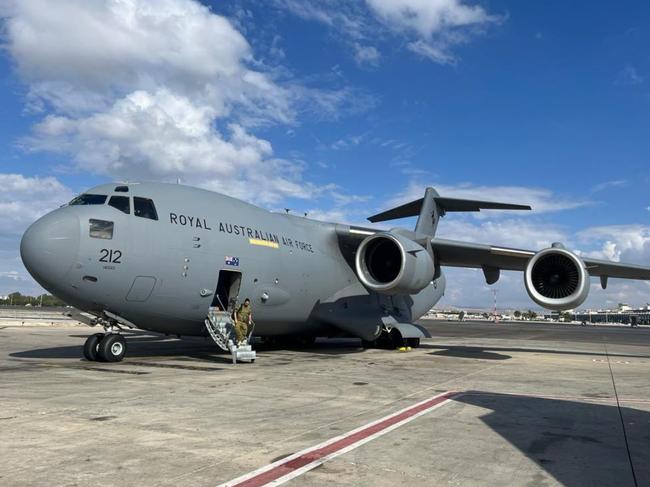
DFAT has today been telephoning the around 700 remaining Australians who had registered including the ones who were supposed to take flights overnight and were a no-show.
Some said they were waiting for better flight options, including anticipating going to London not Dubai, or the timing no longer suited them and they would be requesting a rescue flight later in the week.
Both Defence Minister Richard Marles and Foreign Minister Penny Wong reinforced the need for those wanting to flee the crisis to take the first available flight and not hedge their bets.
“There is another flight planned today, but I emphasise this is a very changeable situation,” Mr Marles said.
“We’re dependent on airspace remaining open, we’re dependent on being able to obtain a slot at Ben Gurion Airport and so a whole lot of things can change at a very short moment’s notice and with that in mind, there were spare seats on the planes last night, so if there are Australians who want to leave Israel, we urge them to take the opportunity that is being provided to them. Don’t wait for it to be convenient, because we don’t know how long this window will remain open.”
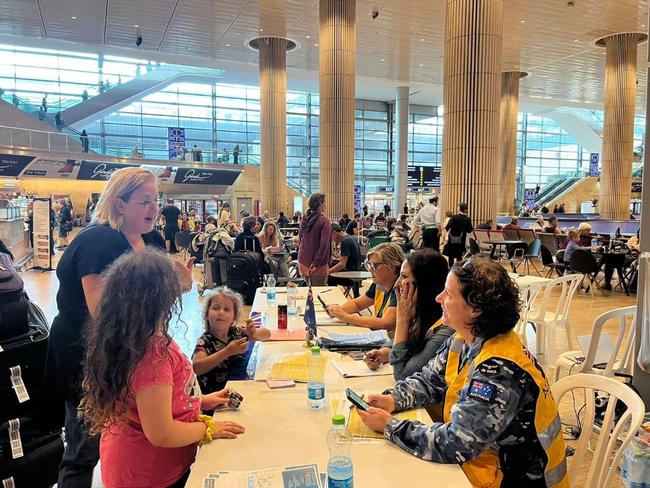
Australia’s military RAAF aircraft will remain pre-positioned in the United Arab Emirates but might not be able to re-enter Tel Aviv if the war escalates as feared.
On Saturday, Foreign Minister Penny Wong announced 850 previously registered Australians and their families had left Israel or the Occupied Palestinian Territories.
She said the Department of Foreign Affairs and Trade was assisting more than 1500 registered Australians in Israel, Gaza and the West Bank. But not all of those are looking to leave.
Two military flights and one government-chartered flight had previously left.
TRAVEL WARNING FOR AUSTRALIAN-LEBANESE
It comes as Lebanese-Australians have been warned to reconsider whether they should remain in Lebanon with the Israeli war threatening to spill across the border.
Ms Wong gave a solemn appeal to Australians and dual nationals living or visiting Lebanon urging them to consider leaving the region while commercial flights were available.
“As you know earlier this week we updated travel advice for Israel, Gaza and the Gaza border, for Israel advice is reconsider the need to travel for Gaza and the Gazan border is do not travel … there has also been an update for Lebanon today,” she said.
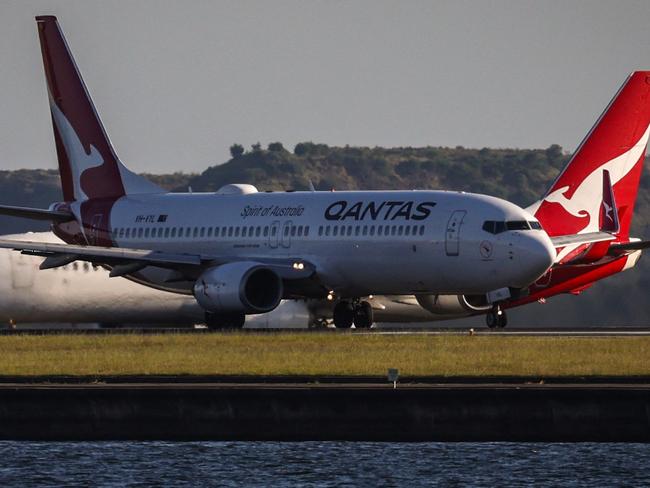
“The existing travel advice for Lebanon is reconsider your need to travel due to the security environment. I am now saying to Australians if you are now in Lebanon you should consider whether your need to remain there is essential. Again, if you are in Lebanon please consider whether your need to remain there is essential. If you wish to leave you should note a crisis could limit your options for departure and you should consider the first available option.”
While there are 10,000 Australians in Israel there could be at least twice that many in Lebanon.
Senator Wong would not go into what prompted the raising of the threat advice for Lebanon.
The Iranian-backed Lebanese based Hezbollah has in the last 48 hours attempted to push militants across the border into Israel as well as fired multiple rockets.
Hezbollah has vowed to join Hamas in combating Israel if the war in Gaza escalates. Iran has also made a similar threat to expand the crisis.
Senator Wong declined to say whether contingency plans were now being considered for Lebanon, saying the focus currently was Israel and Gaza.
The government plans “multiple flights” from Ben Gurion in the Israeli capital Tel Aviv. For security and operational reasons it would not detail timings or destinations. DFAT was working with Qantas and other commercial operators and Defence for onward journeys to return to Australia.
This included from Dubai in the United Arab Emirates where it was likely some of the evacuated citizens would be going.
It is understood DFAT had also been looking at bus transport from Ramallah in the West Bank to the border with Jordan then onto capital Amman.
Options to rescue at leat 20 Australians from Gaza continued; the US had brokered a deal with Egypt for a limited border opening to allow foreigners an avenue to escape the violence but that had so far failed to eventuate.
More than 900 previously registered Australians and their families have left Israel and or the occupied Palestinian Territories since the crisis began.
There is a significant sense of urgency as Tel Aviv could also close its airspace at any time ahead of what the Israeli military has warned would be a significant up-tick in land, air and sea assault on Gaza.
Defence Minister Richard Marles said DFAT was working closely with Defence.
“Options both in terms of civil contracted flights and military Royal Australian Air Force flights are actively being worked on,” Mr Marles confirmed.
“We are positioned, we have the intent to be able to put in place flights very, very soon, I mean, almost immediately and we are continuing to walk down that path.”
Mr Marles added: “There is some greater flexibility that military flights offer in this circumstance”.
JONATHAN SHAFIR
Jonathan Shafir, who is from Melbourne and his American wife Shaira said landing in the UK was a relief after a horror week.
The pair, who have been living in Tel Aviv, attended the funeral of one of 260 Supernova festival goers killed by Hamas militants last weekend.
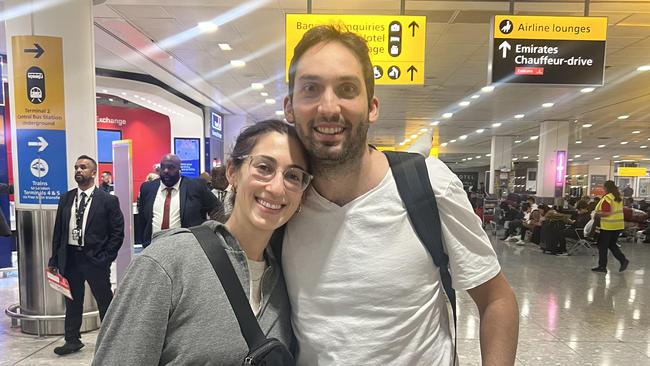
“We went to a funeral of one of the victims who died in the desert,” Mr Shafir said.
“One of my best friend’s sisters was unfortunately found after three days missing.
“It was really rough, obviously for her and her family but luckily we are physically safe,” he said.
“Just the stress is getting to us.”
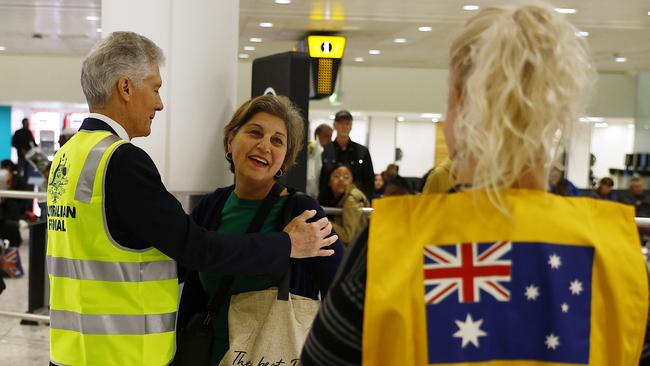
Mr Shafir said the couple’s plan from here remains unclear after the horror conflict broke out.
“We’ll play it by ear. We’ll just be in London for a little bit and then see how the weeks unfold. Days unfold.”
Mrs Shafir said she had conflicted feelings about leaving the country.
“I think most Israelis will tell you, there is a lot of guilt. Especially if you know people affected and having to leave them behind,” she said.
“Obviously you feel selfish but you have to take care of yourself.”
The Australian passengers were chosen on an assessment of vulnerability including medical needs, people with no support network in Israel, and families with young children.
BLAKE JORY
Blake Jory, from the Sunshine Coast, had been spending the past two months visiting his girlfriend, who is a reservist in the Israel Defence Forces.
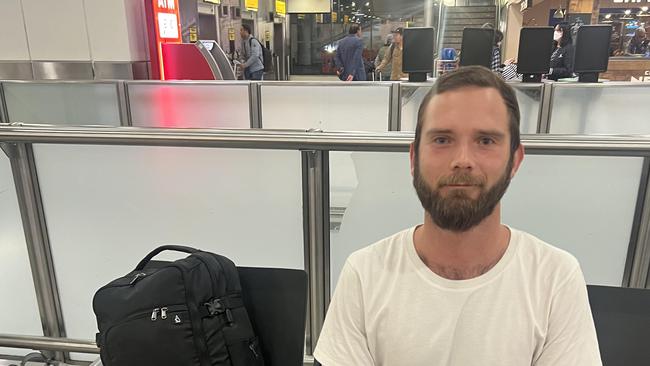
“This past week, hell broke loose,” Mr Jory said.
“She’s been called up. She hasn’t been drafted yet which means she hasn’t been assigned a position and a unit.
“She is in logistics which is good for me because it means she won’t be in the front lines,“ the 29-year-old said.
“I guess that just gives me a little bit of peace of mind.”
Mr Jory said leaving his girlfriend at the airport on Friday was “one of the hardest days” given the uncertainty of what lays ahead.
“She’s already lost a couple of close friends who we only saw about three weeks ago,“ he said.
“One of the friends was actually supposed to get married next month and she had to go to the funeral the other day and seeing all her friends crying and in shock, it’s horrific to see“.
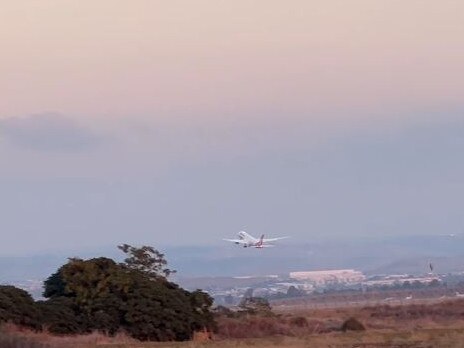
Late on Friday, the Australian Government announced it had secured additional assisted-departure flights, with at least two flights departing Ben Gurion Airport to Dubai. The charter flights will operate separately to the two already announced Qantas flights from Ben Gurion Airport to London.
In addition, Qantas agreed to support Australians arriving in London on assisted-departure flights from Tel Aviv by offering an A380 flight from London to Sydney via Singapore free-of-charge.
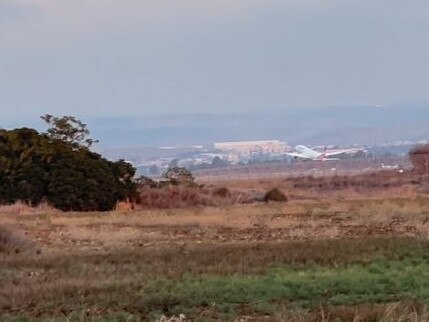
More than 1,600 Australians were registered as being in the region of Israel, Gaza or the West Bank, but not all are necessarily trying to get out.
Australia’s Ambassador to Israel, Ralph King, said 500 had already left and 19 are currently trapped in Gaza.
Addressing the media at the airport on Saturday, he said, “At the moment the airport is open, that situation could change anytime”.
“The concern is that, of course, the number of flights available has sharply diminished and tickets prices are rising so the government agreed that, in the current situation, the priority is to put these flights on for people in distress and who want to leave.”
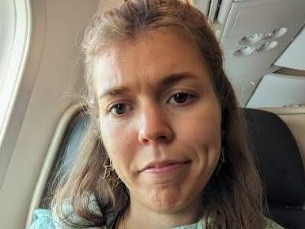
VAHIDEH AND EZZAT HOSSEINI
Lismore grandmother Vahideh Hosseini, 67, her husband Ezzat, 70, and their son Sana, 43, from Melbourne, had spent a total of $20,000 on five cancelled commercial flights to Sydney before securing seats on the rescue flight. They had been holidaying in Haifa in northern Israel when Hamas assailants launched their bloody attack.
“Sirens went off in our Airbnb and a neighbour knocked on our door and showed us where the communal shelter was,” she said.
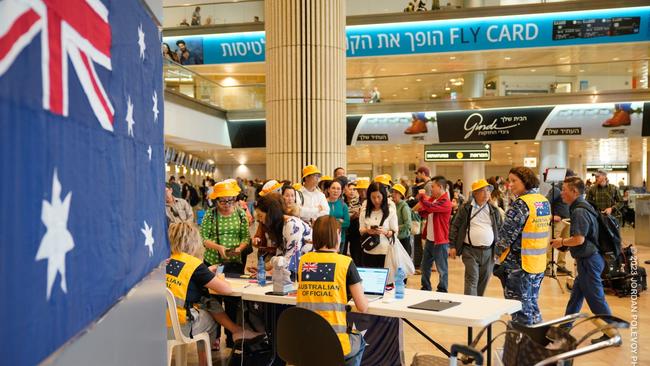
“On the plane over to Tel Aviv we learned something was wrong from the soldier sitting next to me who said he was on holiday when he got called up as a reservist,” she said.
“We knew it would be bad but not this bad, we want to thank the Australian government for getting us out.”
HANNAH BLENCOWE
Hannah Blencowe, 26, a psychology student, said she wanted “to go home, decompress and sleep,” as she waited for the first Australian government assisted flight out of the Israeli capital.
Arriving early at Ben Gurion Airport on Friday, Ms Blencowe, from Erskineville in Sydney’s inner west, broke down in tears at the thought of her rushed departure.
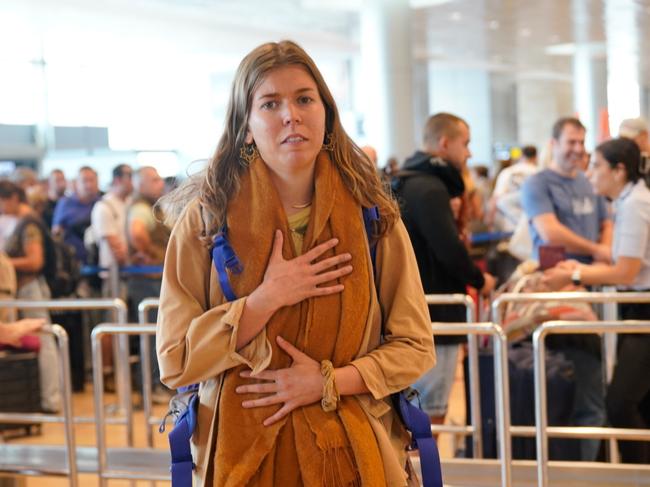
“It feels wrong to be going back to Sydney and talking to girlfriends about broken nails and breakups after going through this,” she said.
“But I’m not trained for war, I’m going home because frankly, I’’m f*****g scared and I don’t want to put an added burden on Israel by being an extra mouth to feed in what’s probably going to be a massive land war. I need to get back home, luckily I don’t have direct family here, but it’s still not an easy decision to leave people behind.
“The prospect of seeing my parents at the other end in Sydney is keeping me going, I’m going to sleep with them in their same bed when I get home.”
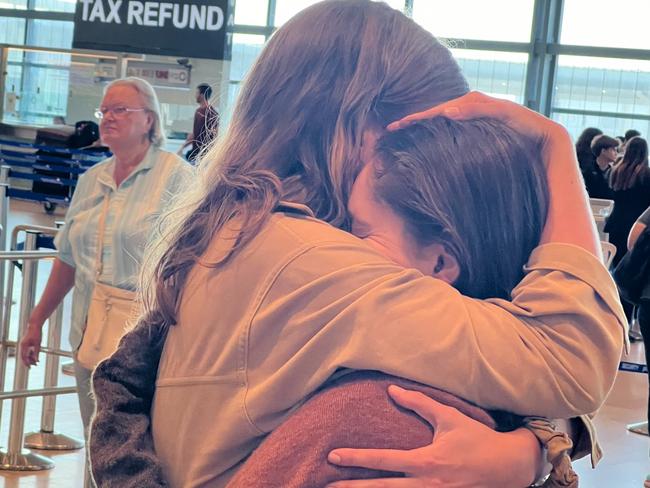
Ms Blencowe was spending six months at Maagan Eden kibbutz learning Hebrew when she woke up to Saturday’s attack on Israel by Hamas militants.
“Every time you hear the Iron Dome go off, you scream. I feel very blessed to be going home to Australia,” she said.
“I cried when I got through the phone to DFAT and they asked for my passport details.
“I told them on the phone ‘thank you for bringing me home’.”
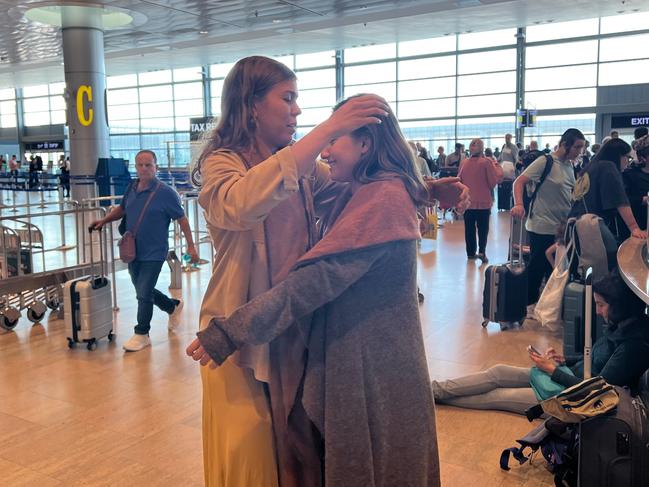
Ms Blencowe embraced her friend Emma as they bid each other an emotional farewell at the terminal.
Emma, who did not want her surname used, had secured a commercial flight home.
The environment science student from Sydney, was shaking nervously, as she waited for her flight.
“I haven’t slept since Saturday,” she said.
“I spent four hours in the laundry room that doubles as a bomb shelter in the student apartment block I was in when Saturday incursion happened.
“There were sirens going off around most of Israel afterwards,” she said.
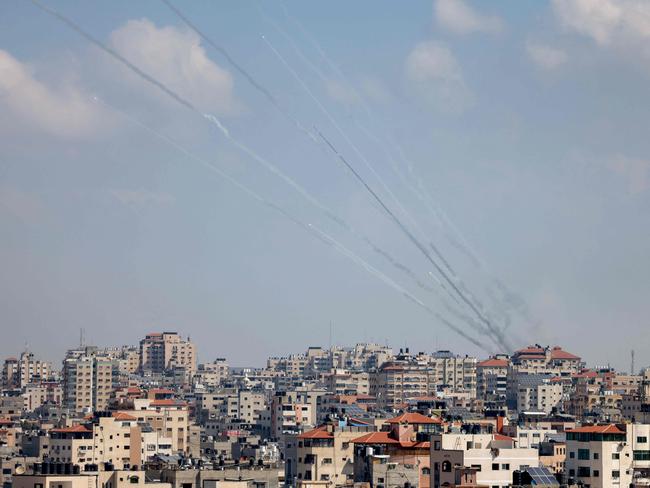
Emma arrived in Rehovot, in central Israel, to study for a masters in environmental science for two years on the day the surprise Hamas terrorist attack happened.
“My uncle died a couple of days ago, I feel torn, I don’t want to leave my aunt behind, she has two children to look after, I want to stay and help her but my parents want me home and booked me a flight,” she said.
“I’m incapable of making decisions right now, I’m a wreck, but I need, also, to minimise the suffering of my parents, and, selfishly, I’m f*****g terrified.”
“This is one of the toughest decisions, leaving at a time when people need help.
“Once I’m home in Sydney I can process what’s happened, once I’m stronger, I can come back and help.”
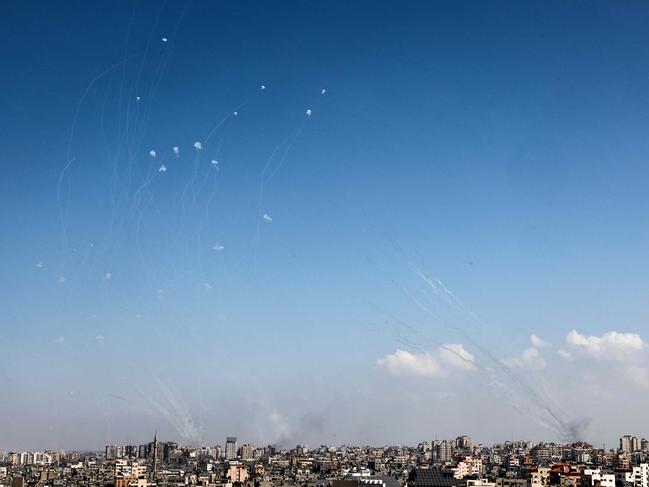
TALI AND ELAD HERTSHTEN
Sydney mother of two Tali Hertshten, 33, her husband Elad, 35, and their two children, Benji, three, and Theodore, seven months, said they had waited with bated breath for the flight to take off.
“We’ve lived here for more than a year and know bomb shelters but this is different; this is a constant state of panic and dread, and we want to go back to my family in Vaucluse,” she said.
“I lost my cousin, a medical officer in the army, and collectively this has such a traumatising energy that we have to leave Israel.
“How do you explain to your little one what a rocket is in a way that won’t traumatise him while you’re in a bomb shelter?
“It’s a difficult decision for us to leave, my husband has parents and a sister here.
“These are surreal times, our priority is to get our family out.”
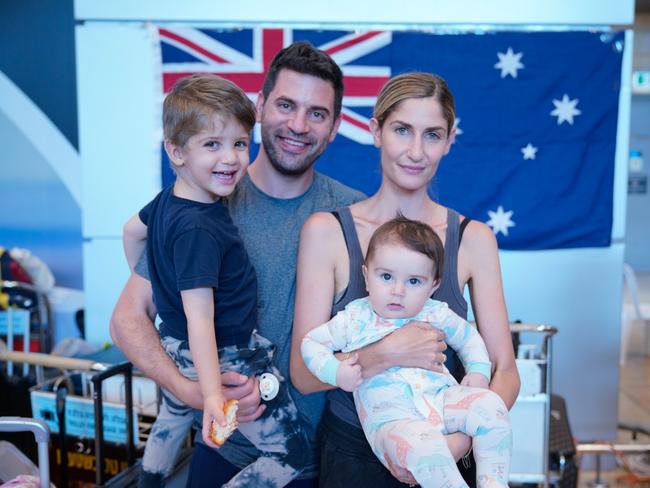
PHILLIP AND BRONWYN BARNES
Australian holiday maker Phillip Barnes, 61, and his wife Bronwyn, 63, from Newcastle, NSW, came with their bags packed to the airport on the off chance they could board the Dreamliner 787 to London.
His voice cracking with emotion, he apologised for crying, saying, “I was with my wife walking along the promenade on Tel Aviv at day break when a siren went off and a rocket exploded above our heads as it was intercepted.
“We ran into a shelter, that was my first time, but it’s happened ten times since, I’m a wreck, I just want out.
“We’re not on this flight, five of the commercial flights we booked have been cancelled but I’m praying the consulate gets us out. I’m frightened, I don’t know what to do.”
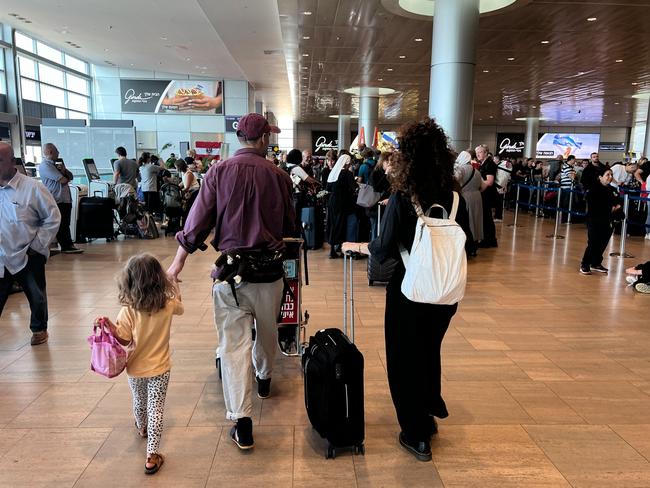
SALLY ANANOVA
Holding onto her baby daughter, Emma, Sally Ananova broke down in tears as she opened up to talk about the “battle of choosing your babies or your family”.
“I'm crying for the first time, it’s sheer relief, I’ve held it back for six days, but I’m about to get out … but mum, my sister, my grandparents?” Ms Aganova said, brushing tears away from her eyes. “My God, I'm leaving them and we don’t know what’s about to happen.
“Do you know how hard it is to get on a flight knowing you are airlifting your children out to safety, but leaving behind your mum and sister?” she continued.
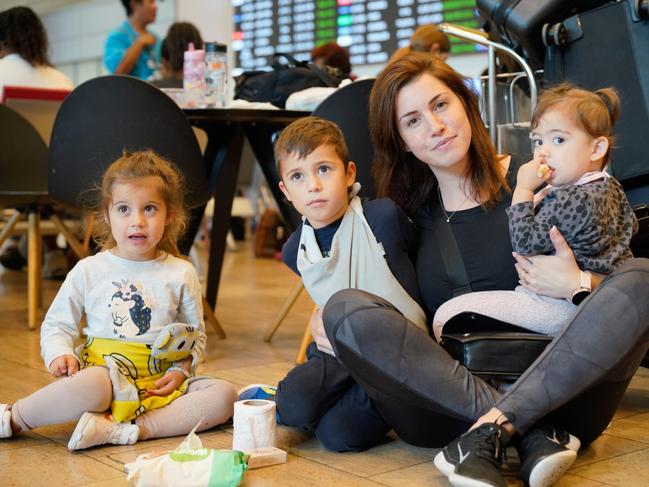
“It’s a battle between your babies and your family, how do you make that choice? It's heartbreaking for us. As a mum I have to get my babies out.
“On the day of the massacres, a bomb went off on the child care centre opposite our rented apartment, thank God it was 6am on Saturday morning and the kids weren't playing.”
Ms Aganova, a book keeper from Melbourne, had come to spend an indefinite time with family in Rehovot in central Israel with her husband and their daughters Mia, three, Emma, two, and son Ariel, five.
“We came six months ago, but now we’re going back (home), I don’t know how long we’re going back to Australia for, but once I get the babies home, I’ll figure out the others,” she said.
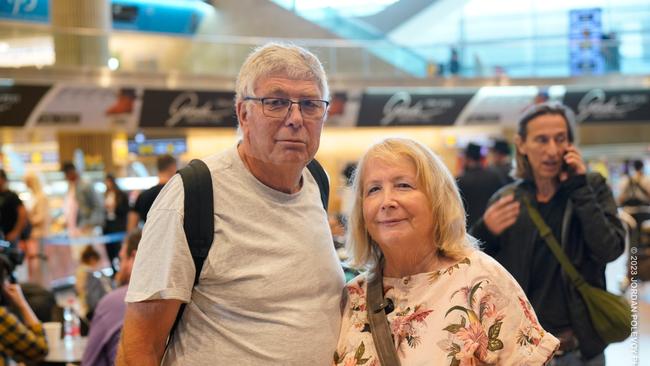
JULIE AND WILLIAM SIMMONS
Grandmother Julie Simmons, 71, and husband William, 74, from Byron Bay in NSW, said the guilt of leaving behind a shattered Israel bore deeply, as they waited for the Qantas flight bound for Heathrow.
They were on holiday for three months in the northern Israeli port city of Haifa when the massacres happened.
“We had one more week to go and we don't want to go and leave people behind,” Ms Simmons said.
“There is so much grief and post trauma here, everyone knows someone who has been raped, or kidnapped, killed, or missing.
“We don’t want to go, but my daughters and grandchildren in Australia have been calling, my granddaughter has been crying saying ‘Grandma, please come home’.”
More Coverage
Originally published as Final flight for Aussies fleeing Israel




